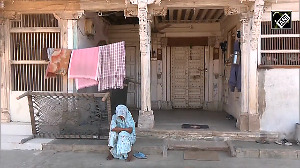When last week, the Indian government declared the outbreak of chikungunya in Kerala an epidemic, it hit hard the reputation of a state once proclaimed as the national model in healthcare and human development.
After three weeks of combating the mosquito-bred viral disease, which has so far claimed more than 100 people in the state, health experts and politicians are fighting a different battle.
Joining issues over the outbreak are Kerala Chief Minister V S Achuthanandan and Union Health Minister Anbumani Ramadoss.
Ramadoss, who spent a day in Alappuzha district which has seen the largest number of deaths, says it is not chikungunya.
Irked by this statement, Achuthanandan shot back: 'Those who say the deaths were not due to Chikungunya are duty bound to make it clear how such a large number of deaths had occurred in Alappuzha."
It is not just the political class which has differences of opinion.
A study carried out by the Indian Medical Association has found that the Alappuzha deaths since early September were possibly not due to chikungunya.
Similarly, a central team comprising experts from WHO, the National Institute of Virology and the National Institute of Communicable Diseases, which had been camping at Cherthala - the hardest hit town in Alappuzha - are yet to finally confirm whether the disease is chikungunya or not.
As doctors and politicians debate if it is indeed chikungunya, experts say the outbreak has exposed the weaknesses of Kerala's once-model healthcare system.
For two decades now, WHO and the national institutes have applauded the 'good health at low cost' model of Kerala's healthcare based on social justice and equity.
"But this model is crumbling in Kerala. The basic reason for this is that public healthcare system and infrastructure have been totally ignored in the state in the last 20 years," points out Dr N Gopikrishan, who heads the People for Health Movement.
He says Kerala's healthcare system is losing its edge. "It is basically because there has been no infrastructure development in the health sector all these years," he says.
Experts like Dr Gopikrishnan says though everyone from the politician to panchayat level officials know that the backwaters surrounding many parts of the state are also a breeding ground for mosquitoes, there has been no mosquito eradication programme in places like Alappuzha all these years.
Kerala's Health Minister P K Sreemathi admits that it is the laxity in mosquito eradication in places like Alappuzha that has resulted in diseases like chikungunya.
"Epidemics like this are new to Kerala. We need to find out what are the factors that have lead to this. We need to review the basic healthcare parameters in the state," she told rediff.com.
For years, Kerala's basic health parameters like birth and death rates and the multi-tier network of government hospitals have been far ahead of other states in India. But experts say the inability of the state administration to quickly contain the spread of chikungunya points to the virtual collapse of the health delivery system.
"Look at our government hospitals. Most of them are in a pitiable condition. If you enter a government hospital in Kerala, you are sure to get some disease. I do not know why politicians want to proclaim Kerala as a model state of development in healthcare," says K P Alphonse, a social activist who works among fishermen in Alappuzha.
Alphonse says though over the years Kerala has made major strides in reducing most of the infectious and communicable diseases, it has virtually failed to prevent non-communicable diseases. "The healthcare infrastructure and planning in Kerala are very poor and inadequate," he points out.
The government's own statistics prove this. Health department figures show that the state ranks top in diabetes (980 per lakh against the all-India number of 221) and mental diseases (283 against 132 all-India), and ranks second in hypertension (1433 against all-India 584) and heart diseases (914 against 385 all-India).
Kerala's record in keeping the environs clean and hygienic has also been dismal.
Congress leader K Venugopal, who was tourism minister in the previous Oommen Chandy government, says lots of measures have been taken to clean up water-logging in districts like Alappuzha. "Chikungunya proves that Kerala needs to embark on cleaning up the environment on a war footing," he says.
So what can be done now to ensure that Kerala is not hit by chikungunya and other diseases?
According to Dr Churchin Ben, former additional director of the state health department, Kerala needs a new health policy. "The policy should have a village-level coordinated approach for public health concerns like sanitation, waste disposal and environmental protection," he says.
"We also need to set up scientific institutions in the state. It is sad that Kerala does not have any centre that deals with virology and communicable diseases," Dr Ben pointed out.
Measures to check the spread of chikungunya are on in full swing in Kerala, but if the outbreak does not prompt the government to embark on a new healthcare policy, similar diseases are set to visit the state again, and again.






 © 2025
© 2025